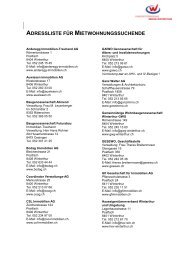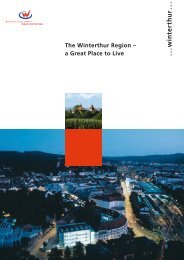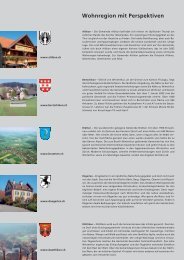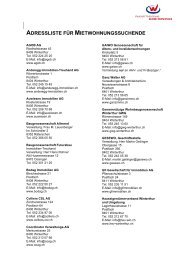Handbook for Investors. Business location in Switzerland.
Handbook for Investors. Business location in Switzerland.
Handbook for Investors. Business location in Switzerland.
Create successful ePaper yourself
Turn your PDF publications into a flip-book with our unique Google optimized e-Paper software.
If the weekly maximum work<strong>in</strong>g hours are exceeded, this is<br />
referred to as excess hours. Under the Labor Act, excess hours<br />
may not exceed two hours per day <strong>for</strong> an <strong>in</strong>dividual employee.<br />
In total, the excess hours may not exceed 170 hours per year <strong>for</strong><br />
employees with a weekly maximum work<strong>in</strong>g time of 45 hours, or<br />
140 hours <strong>for</strong> employees with a weekly maximum work<strong>in</strong>g time of<br />
50 hours. Unless compensated by time <strong>in</strong> lieu with<strong>in</strong> a reasonable<br />
time, excess hours must be paid at a premium of 25 %.<br />
In contrast to many European countries, the consent of the employee<br />
representative committee is not necessary <strong>in</strong> <strong>Switzerland</strong><br />
<strong>for</strong> overtime or excess hours. Neither is it necessary to obta<strong>in</strong><br />
official approval, provided the above limits are not exceeded.<br />
8.4.3 Day work and even<strong>in</strong>g work<br />
Work<strong>in</strong>g hours from 6:00 a.m. to 8:00 p.m. are considered day<br />
work; the hours from 8:00 p.m. to 11:00 p.m. constitute even<strong>in</strong>g<br />
work. Day and even<strong>in</strong>g work do not require approval. However,<br />
even<strong>in</strong>g work may be <strong>in</strong>troduced only after consultation with<br />
the employee representative committee, or if there is none, after<br />
consultation with the affected employees. This rule allows the<br />
<strong>in</strong>troduction of a two-shift operation without government approval.<br />
The work<strong>in</strong>g time of an <strong>in</strong>dividual employee, <strong>in</strong>clud<strong>in</strong>g breaks and<br />
excess hours, must be with<strong>in</strong> a period of 14 hours.<br />
8.4.4 Night work, work<strong>in</strong>g on Sundays and public holidays<br />
Approval from the authorities is required if night work is needed.<br />
For temporary night work, a premium of 25 % must be paid. For<br />
permanent or regularly recurr<strong>in</strong>g night work, employees are entitled<br />
to paid leave of 10 % of the time worked dur<strong>in</strong>g night hours.<br />
This leave must be granted with<strong>in</strong> one year. There is no entitlement<br />
<strong>for</strong> compensation <strong>in</strong> the <strong>for</strong>m of paid leave if the average<br />
shift time, <strong>in</strong>clud<strong>in</strong>g breaks, does not exceed seven hours, or if<br />
the person work<strong>in</strong>g at night is employed <strong>for</strong> only four nights per<br />
week.<br />
Sunday is def<strong>in</strong>ed as the time between 11 p.m. on Saturday and<br />
11 p.m. on Sunday. Except where special regulations apply to certa<strong>in</strong><br />
sectors, approval from the relevant authority is also nee ded <strong>for</strong><br />
work on such days. Only one holiday – August 1, Swiss National<br />
Day – is treated as equivalent to a Sunday throughout the whole<br />
country.<br />
The cantons may declare up to eight additional holidays as equivalent<br />
to a Sunday. They must be differentiated from the legally<br />
recognized public holidays: Although the same rules generally<br />
apply to these days as to holidays treated as Sundays, the legal<br />
basis <strong>for</strong> this is def<strong>in</strong>ed by the canton or municipality and so may<br />
differ <strong>in</strong> detail from the provisions regard<strong>in</strong>g Sundays.<br />
Fig. 39: Demarcation of day, even<strong>in</strong>g and night<br />
6 a.m. 8 p.m. 11 p.m.<br />
N<br />
Day<br />
Even<strong>in</strong>g N<br />
Max. 14 hours<br />
B<br />
17 hours requires no approval B<br />
N = night hours B = requires approval<br />
Source: State Secretariat <strong>for</strong> Economic Affairs<br />
8.4.5 Holidays and public holidays<br />
All employees <strong>in</strong> <strong>Switzerland</strong> are entitled to at least four weeks’<br />
paid leave per year (young people under the age of 20 are entitled<br />
to five weeks), two of which must be taken consecutively.<br />
Part-time employees are also entitled to paid leave <strong>in</strong> proportion<br />
to the percentage of standard hours they work. Leave must be<br />
taken; it may not be compensated through payment. There are<br />
no further statutory leave entitlements. However, longer entitlements<br />
are customary <strong>in</strong> collective barga<strong>in</strong><strong>in</strong>g agreements, and 25<br />
days per year are usually granted to employees over the age of<br />
50. Dur<strong>in</strong>g time off, salaries are paid <strong>in</strong> exactly the same manner<br />
as dur<strong>in</strong>g regular work<strong>in</strong>g time. Additional vacation pay, as<br />
frequently encountered <strong>in</strong> tariff agreements <strong>in</strong> the EU, is unknown<br />
<strong>in</strong> <strong>Switzerland</strong>.<br />
<strong>Handbook</strong> <strong>for</strong> <strong>Investors</strong> 2010<br />
73









